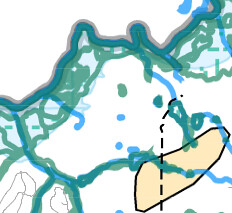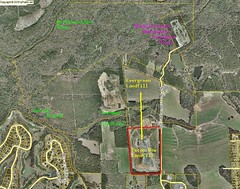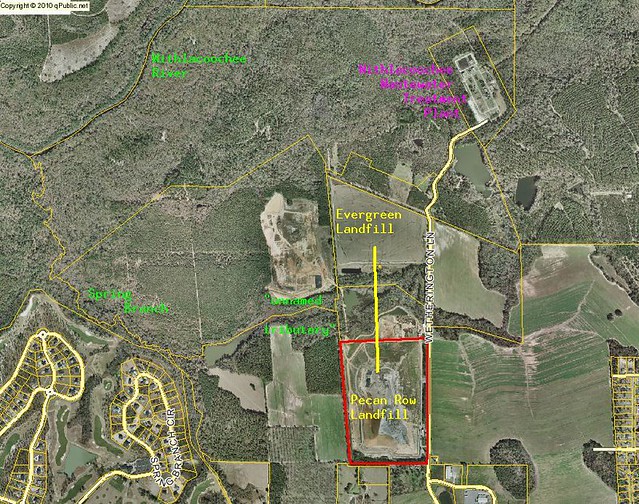In a recharge zone for
our drinking water supply, the Floridan Aquifer,
is the Pecan Row Landfill

 with its
PCBs and
coal ash.
That proposed
landfill pipeline requiring cutting through the vegetative buffer
along an unnamed tributary to Spring Branch?
Also at least partly in the recharge zone. Continue reading
with its
PCBs and
coal ash.
That proposed
landfill pipeline requiring cutting through the vegetative buffer
along an unnamed tributary to Spring Branch?
Also at least partly in the recharge zone. Continue reading
Tag Archives: coal ash
Landfill pipeline
 Apparently
ADS’s landfill gas project
wants to take in methane from the closed old landfill, as well,
according to a public notice today that proposes
a pipeline from the old
Evergreen Landfill
to the
Pecan Row Landfill that has the natural gas turbine.
Nevermind
the
$27,500 fine for PCBs or
that
coal ash in the landfill that nobody on the Lowndes County Commission
or Valdosta City Council or Deep South Solid Waste Authority (SWA) can be bothered to check on.
Nevermind the
unaccounted for tipping fees
or
host fees.
I wonder if cutting through that vegetative buffer will let the coal ash and PCBs reach the Withlacoochee River more easily?
Apparently
ADS’s landfill gas project
wants to take in methane from the closed old landfill, as well,
according to a public notice today that proposes
a pipeline from the old
Evergreen Landfill
to the
Pecan Row Landfill that has the natural gas turbine.
Nevermind
the
$27,500 fine for PCBs or
that
coal ash in the landfill that nobody on the Lowndes County Commission
or Valdosta City Council or Deep South Solid Waste Authority (SWA) can be bothered to check on.
Nevermind the
unaccounted for tipping fees
or
host fees.
I wonder if cutting through that vegetative buffer will let the coal ash and PCBs reach the Withlacoochee River more easily?

The yellow path indicated for the pipeline is just a guess.
In the VDT today, PUBLIC ADVISORY NOTICE,
The proposed project located west of Valdosta, in Lowndes County, GA along Wetherington Lane near the Pecan Row Landfill facility (2995 Wetherington Lane, Valdosta, GA, 31601) involves buffer encroachments necessary to install a 30-inch gas pipeline. This pipeline will Continue reading
VDT should dig deeper into county trash
 The VDT should dig deeper into the finances of Lowndes County trash collection.
Nobody has ever seen an accounting of where where the money went for
the county’s former waste collection sites, so nobody knows whether
the county was really losing money or how much, and the county’s
version of how those sites had to be paid for doesn’t match state law..
Sure, Bill Slaughter defending a decision made when Ashley Paulk was chair
is amusing, but instead of transcribing what county officials tell it,
the VDT could find lots more under the county’s garbage with a little digging.
The VDT should dig deeper into the finances of Lowndes County trash collection.
Nobody has ever seen an accounting of where where the money went for
the county’s former waste collection sites, so nobody knows whether
the county was really losing money or how much, and the county’s
version of how those sites had to be paid for doesn’t match state law..
Sure, Bill Slaughter defending a decision made when Ashley Paulk was chair
is amusing, but instead of transcribing what county officials tell it,
the VDT could find lots more under the county’s garbage with a little digging.
Jason Schaefer write for the VDT Thursday, Concerns continue over garbage agreement: Business owner argues case against County
The County is not required under Georgia law to issue RFPs to any company for waste disposal services, according to Slaughter. That decision was made in a good-faith effort to find the lowest possible rate for garbage service for the citizens of Lowndes County, he said Tuesday.
Is that the point of county government, to act like Wal-Mart?
Is money the only value the county government can name?
 Everyone I talked to about the trash issue in 2012 who already
had a waste collection card said they’d be willing to pay more
to keep the sites open.
Maybe if the county had held public hearings they would have learned that.
Everyone I talked to about the trash issue in 2012 who already
had a waste collection card said they’d be willing to pay more
to keep the sites open.
Maybe if the county had held public hearings they would have learned that.
And does anyone believe ADS’s rates are going to stay that low? Look at Wakulla, Florida, where it’s $196/year. But the bigger question is why did the county privatize trash collection anyway?
Continue readingWhen contamination gets into the watershed
 Underground may be out of sight, but it just keeps seeping farther,
getting into more wells, poisoning more wetlands, and getting into the air,
causing cancer and other diseases.
Underground may be out of sight, but it just keeps seeping farther,
getting into more wells, poisoning more wetlands, and getting into the air,
causing cancer and other diseases.
Katie Leslie and Shannon McCaffrey wrote for the AJC 13 April 2013, 20 years later, Fort Gillem contamination still spreading,
In the early 1990s the U.S. Army discovered hazardous chemicals dumped at Fort Gillem seeping into residential wells in neighboring Forest Park. The finding prompted the military to pass out bottled water and convert many residents to a county water system from their private wells.
But two decades and a base closure later, state officials say the Army still hasn’t done enough to clean up known and suspected carcinogens that are migrating from groundwater into surface water and, potentially, into the air residents breathe.
We might want to think about that before importing coal ash; oh, wait, we already did! Maybe at least we should not import any more of it. We already have cancer-causing arsenic in some of our wells; we don’t need more. And what about that Continue reading
Plant Scherer coal ash maybe related to uranium in well water
Uranium has been found in well water near Juliette, Georgia, but tests by several different groups of researchers differ on whether it might be related to nearby coal ash from Plant Scherer. The same coal ash ponds near which some people are getting cancer from uranium in their well water. Coal ash like we have in Veolia landfill in Lowndes County.
S. Heather Duncan wrote for Macon.com yesterday, New water test results shed light on Juliette contamination,
Continue readingMany Juliette residents have expressed concern that a coal ash pond
at Plant Scherer, one of the largest coal-fired power plants in the country, might be causing the problem. Georgia Power is majority owner and operator of the plant and its 750-acre, unlined pond filled with coal ash slurry, which can contain heavy metals such as uranium….
Since then, water samples tested by the Environmental Protection Agency, as well as a smaller group of samples tested by a group of University of Georgia graduate students, showed no pattern of contamination that could be clearly linked to groundwater flow from the coal ash pond. The samples were taken last year, but in some cases it took months for the samples to be analyzed….
On the other hand,
Coal ash and political spending transparency shareholder resolutions defeated @ SO 2012-05-23
 Defeated, but with increased shareholder support this year, two shareholder transparency resolutions have been introduced year after year at Southern Company (SO), one on coal ash and the other on political spending. Here’s video of the political spending resolution being presented at the meeting, and here’s the text of the resolution. This year as usual the SO board opposed both resolutions, and as you can hear SO CEO Thomas A. Fanning announce in this video, both were voted down, with these percentages:
Defeated, but with increased shareholder support this year, two shareholder transparency resolutions have been introduced year after year at Southern Company (SO), one on coal ash and the other on political spending. Here’s video of the political spending resolution being presented at the meeting, and here’s the text of the resolution. This year as usual the SO board opposed both resolutions, and as you can hear SO CEO Thomas A. Fanning announce in this video, both were voted down, with these percentages:
- 26% for Coal combustion byproducts environmental; higher than the 21% in 2010.
- 11% for Lobbying contributions and expenditures report
The reasons the board gave for opposing the political spending transparency resolution include that SO claims it is already disclosing everything it needs to. Much of that disclosure started in 2006 due to shareholder and outside pressure to do so. Center for Political Accountability press release 5 April 2006,
McDonald’s (NYSE: MCD) and Southern Co. (NYSE:SO) agreed to disclose and have their directors oversee soft money political contributions made with corporate funds, shareholder activists announced today. The groups, Washington-based Center for Political Accountability (CPA), socially responsible investment firm Trillium Asset Management Corp., and the Central Laborers’ Pension Fund, are part of a nationwide campaign to bring transparency and accountability to company political spending.
In its own 2012 statement of opposition, the SO board noted shareholder pressure is having an effect on transparency:
Continue readingCoal ash at Plant Scherer considered harmful for your health
Penny-wise, pound foolish, that's coal and coal ash, we're all discovering.
S. Heather Duncan wrote for the Macon Telegraph 14 April 2012, Plant Scherer ash pond worries neighbors as Georgia Power buys, levels homes,
The home among the trees was supposed to be Mark Goolsby's inheritance. His 78-year-old mother now lives in the large, white, wood farmhouse that his family built before the Civil War.
But Goolsby says he'll never live there now.
That's because across the street and through those trees is one of the largest coal ash ponds in the country. It belongs to Plant Scherer, a coal-fired plant that came to the neighborhood considerably later than the Goolsby family. In the mid-1970s, Goolsby said, “when (Georgia Power) bought 350 acres from my dad, they told him we'd never know they were there.”
Those acres are now part of an unlined pond where Georgia Power deposits about 1,000 pounds of toxic coal ash a day. Neither federal nor Georgia rules require groundwater monitoring around the pond. The federal Toxic Release Inventory shows that in 2010 alone, the pond received ash containing thousands of pounds of heavy metals and radioactive compounds including arsenic, vanadium, and chromium.
The U.S. Environmental Protection Agency estimates that up to 1 in 50 residents nationally who live near ash ponds could get cancer from the arsenic leaking into wells. The EPA also predicts that unlined ash ponds can increase other health risks, such as damage to the liver, kidneys and central nervous system, from contaminants such as lead.
A massive 2008 spill from a Tennessee coal ash pond led to greater scrutiny of the dams that hold these ponds in place, and the EPA promised new rules for storing coal ash. The process led to broader awareness of a more long-term health threat: groundwater contamination from the ponds.
So what's Georgia Power's solution?
Monroe County property records show Georgia Power has spent about $1.1 million buying property near Plant Scherer between 2008 and the end of 2010. But the true number may be higher.
They're going to have to keep doing that until they buy up a lot more property, I predict.
Wouldn't it be cheaper for the future bottom line of Georgia Power and its parent the Southern Company to invest in solar and wind power?
-jsq
